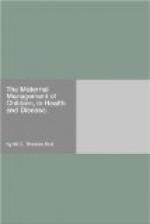Dr. Paris on Diet.
Fruits.—These, and of all kinds whether fresh or dried, a delicate child is better without; except the orange, which when perfectly ripe may be allowed to any child, but the white or inner skin should be scrupulously rejected, as it is most indigestible.
A healthy child may be permitted to partake of most fresh fruits. Of the stone-fruits, the ripe peach, the apricot, and nectarine, are the most wholesome; but cherries, from the stones being but too frequently swallowed, had better not be allowed. Apples and pears, when ripe and well masticated, are not unwholesome; and the apple when baked affords a pleasant repast, and where there is a costive habit, it is useful as a laxative. The small-seeded fruits, however, are by far the most wholesome. Of these, the ripe strawberry and raspberry deserve the first rank. The grape is also cooling and antiseptic, but the husks and seeds should be rejected. The gooseberry is less wholesome on account of the indigestibility of the skin, which is too frequently swallowed.
Dried fruits a child should never be permitted to eat.
Water.—This should be the only beverage throughout childhood. Toast-and-water, if the child prefer it, which is rendered slightly more nutritive than the more simple fluid. The water employed in its preparation, however, must be at a boiling temperature, and it ought to be drunk as soon as it has sufficiently cooled; for by being kept, it acquires a mawkish and unpleasant flavour.
Wine, beer, etc.—The practice of giving wine, or, indeed, any stimulant, to a healthy child, is highly reprehensible; it ought never to be given but medicinally.
The circulation in infancy and childhood is not only more rapid than in the adult, but easily excited to greater vehemence of action; the nervous system, too, is so susceptible, that the slightest causes of irritation produce strong and powerful impressions: the result in either case is diseased action in the frame, productive of fever, convulsions, etc.; wine, accordingly, is detrimental to children.
An experiment made by Dr. Hunter upon two of his children illustrates, in a striking manner, the pernicious effects of even a small portion of intoxicating liquors in persons of this tender age. To one of the children he gave, every day after dinner, a full glass of sherry: the child was five years of age, and unaccustomed to the use of wine. To the other child, of nearly the same age, and equally unused to wine, he gave an orange. In the course of a week, a very marked difference was perceptible in the pulse, urine, and evacuations from the bowels of the two children. The pulse of the first was raised, the urine high coloured, and the evacuations destitute of their usual quantity of bile. In the other child, no change whatever was produced. He then reversed the experiment, giving to the first the orange, and to the second the wine, and the results corresponded: the child who had the orange continued well, and the system of the other got straightway into disorder, as in the first experiment.[FN#15]




